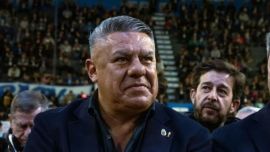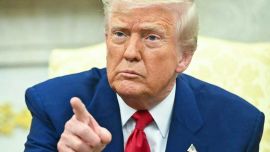More than one Juntos por el Cambio leader was taken by surprise. The former president, in person, was trying to convince some in the opposition that they should not support the government’s debt agreement with the International Monetary Fund (IMF), arguing that qualified opinions had been informing him that the negotiations were disappointing and assuring that if everything came to grief, Kirchnerism would place them in the role of accomplices.
“They’re going to screw us and blame me,” Mauricio Macri told them. Despite a potential default, which was just around the corner, the former president was not yielding to the pleas of his Radical and Civic Coalition allies not to complicate the life of Alberto Fernández any further.
Macri’s vision changed on March 9, when the lower house Chamber of Deputies succeeded in reducing the IMF bill to a single article permitting the government to refinance its debt repayments without endorsing the political programme in the annex of the initial draft. Via a Zoom call, in which the main figures of the opposition participated, Macri finally called for concord. “We must accompany it,” he ruled.
The political whirlwind that followed made the former president’s initial reaction pass almost unnoticed, but among the many leaders of Juntos por el Cambio a dilemma was refloated, one which has been lurking since December 10, 2019: What is Macri’s place in the scheme of things?
The agreement with the IMF returned the PRO party founder to the centre of the ring. Weary of the criticisms and insults from the government, he loudly demands that Juntos por el Cambio defend him. He feels his party colleagues are entering into a ruthless race for the 2023 presidential candidacy with nobody recognising his place and role. Now he is organising meetings, involved in every aspect of the opposition coalition and debating with himself whether to run again, or limit himself to being a kingmaker. But there can be no doubt now that he will be actively participating in internal politics. If he does not launch his own candidacy, he will give his blessing to the leader presenting the best government team. Macri is reloaded.
Days of fury
As the days went by, the ex-president’s mood became more moderate. Chats with economists and an exchange of opinions with United States Ambassador Marc Stanley made him recapitulate – he understood that default was too high a political cost, not only for this government but also for the next one. The fall-out from the bomb would hit Juntos if they return to power in 2023.
At the start of the debate, Macri headed the “hardliners,” as defined by a deputy, seconded by the hawks of PRO, who were convinced as to “the worse, the better,” even thinking of a 2001-style refundation. Nevertheless, nobody admits in public that the opinion of the ex-president was at any time not to accompany the government.
Even one leader who revealed off-the-record that the PRO leader had tried to seduce him into his extreme position assured a television programme a few hours afterwards that “when the issue was debated, Macri said that debts must be honoured.” Nobody wants to shoot themselves in the foot.
For the time being the shots aimed at the former president have been fired in the air like the dart which Facundo Manes directed at the hawks after voting to approve the agreement in the Chamber of Deputies: “I celebrate that many of us leaders in Argentina have been thinking of the country and not of their personal political project. The Radicals have always thought of the country in their discussions.”
The only opposition politician to call out Macri has been Gerardo Morales. Even though they met up in a Martínez bar in early March, the Radical party chairman shot him down in flames as soon as he spotted the opportunity. “I wouldn’t want him to be president again. That’s my opinion. He didn’t like that and that’s why he’s annoyed with me. I say what I think while others talk behind his back,” Morales said recently.
After the debate, the Jujuy Province governor thanked all the opposition parties, except PRO. That’s why Morales is now in Macri’s sights – the Radical’s style arouses much mistrust in him. “Watch out with Gerardo, he’s a turncoat: one time he hits out at me and another time at you,” he warned Horacio Rodríguez Larreta in one of their latest communications.
The relationship between the ex-president and the City mayor improved this summer when both were vacationing in the Cumelén country club. They shared various social meetings and one-on-one chats. Macri recriminated him for the same thing as all the rest – the lack of recognition. The mayor apologised and, from that moment on, the conversations between both became much more fluid. That could be interpreted as signs of appeasement, as taught by ethology, the science of animal and human behaviour. Rodríguez Larreta consents and calms him down, although later he does what best suits him.
The City mayor needs Macri on his side in his presidential adventure. If there is a primary within PRO, his support would be a necessary condition for advancing to the general elections. Furthermore, it would guarantee a generous number of militants who could be scrutineers during the elections – an abstract detail of great importance on election day.
Everybody is fighting for the nod from the former president. Patricia Bullrich also wants his blessing and is convinced that she can dispute the protagonism of Rodríguez Larreta, despite rumours which have her as the Buenos Aires gubernatorial candidate. In her entourage they hasten to deny that – she is going all-out for the Casa Rosada, they say.
The fact that Macri is again in the centre of the ring is also evidence of a procedural change in his diary. According to one Juntos leader, beforehand, in order to meet up with the ex-president, it was necessary to call his secretary Amparo García Blesa, a confidante of Fernando De Andreis who since last year has replaced the historic Anita Moschini upon her retirement. Now it is the PRO leader who is asking for meetings with deputies and senators.
“He has decided to resume his protagonism,” the sources assure.
In the ring
The news that Macri is back in the centre of the political landscape has generated a buzz among some in Juntos por el Cambio, but others who have aspirations to be leaders of the pack are worried. They believe the ex-president could transform himself into an obstacle.
For Frente de Todos, the reappearance of Mauricio Macri triggers celebrations and constant criticism. “The government is doing badly but on the other side is Macri,” a consultant very close to Alberto Fernández assures ironically. The latest to take aim at him was Grandmothers of Plaza de Mayo President Estela Barnes de Carlotto, who wants both Alberto Fernández and Cristina Fernández de Kirchner to be “more severe” with the ex-president.
One of Macri’s last public activities in Argentina before leaving for the United States recently was to visit Expoagro, the country’s biggest trade fair related to farming. He strolled among the stands, accompanied by his former production minister Francisco Cabrera, to applause and other gestures of affinity.
Nevertheless, Macri is disappointed. He understands that the government’s agreement with the IMF will give it the chance to reach the end of its term without major upheavals but there will be neither margin nor desire for any kind of reforms. And without those, the country will remain in a coma for the next few years. The idea of no important changes taking place frustrates him. In the debate over the agreement with the IMF, Macri felt used by the government but also unprotected by his own people. It annoyed him the number of times the government bill named him as the man most responsible for the situation. The argument of “Macri’s debt” has put him on the warpath.
This anger placed him in an uncomfortable position. The stances of the ex-president and the La Cámpora leader Máximo Kirchner suddenly resembled each other too much. The two extremes, the harshest opinions on either side of the grieta chasm, overlapped in their dissatisfaction with the government’s bill. Congress was a triumph of the moderates and that exposed them both.
Nevertheless, unlike Máximo, Macri changed direction in time. The veep’s son remained visibly isolated after not participating in the debate and then going down to the lower house floor at the last moment to vote against it, as one of a minority. The ex-president, in contrast, was convinced in time that he had to give his support. When the opposition managed to reduce the bill to just a request for credit, excluding itself from the responsibility for the political memorandum, he allowed his arm to be twisted and even unwillingly convinced some of his hawks to climb down from their all-out stances. “He was pretty annoyed but understood that it was the best,” revealed a leader who participated in the Zoom of the internal negotiations.
Mauricio Macri is back and many of the officials from his Presidency are reappearing with him. Indeed in early March, the ex-president was reunited with his former cabinet chief Marcos Peña in his Avenida Libertador office. The relationship is being reconstructed.
Like no other leader, the PRO founder has full power to twist the course of many ambitions. “If Mauricio decides to play, they’ll all have to step down,” exaggerates a deputy who has an optimal relationship with the ex-president. If he does not play, the candidates will require his blessing. For that reason, they are waiting until the end of the year for this great dilemma to be resolved. Meanwhile the opposition will have to live with uncertainty.


























Comments